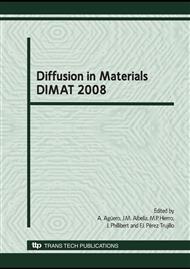p.185
p.195
p.203
p.211
p.219
p.227
p.235
p.243
p.253
Investigation of Phase Transformation of Forged Steel Cold Rolls due to Heat Affecting and Prevent its Failure
Abstract:
In rolling Industries, cold rolls are chosen of low alloy steel heat treated to about 60 RC in 50 millimeter depth on surface. Troostite phase which happens in some cases in tempered martensite has lower fracture toughness, although its ductility is a little more. In rolling process, some technological problems seldom take place, and the roll might be locally heated accidentally. In cold rolling technology, this effect may cause a phase change in metallurgical structure on the surface of the cold work forged steel rolls, named Troostite. However, the rolls which subjected to this problem have no mechanical defect to be detected by NDT, but these kinds of affected rolls may be failed in working (rolling) by fracture, spalling or cracks. So Troostite is a harmful phase for rolls and causes lots of losses for rolling companies. The following paper is a practical industrial approach to show and follow thermal instability of roll surface and metallurgical change of the surface from sorbite to troostite by diffusion mechanism, due to any improper mill usage.
Info:
Periodical:
Pages:
219-224
Citation:
Online since:
April 2009
Authors:
Price:
Сopyright:
© 2009 Trans Tech Publications Ltd. All Rights Reserved
Share:
Citation:


